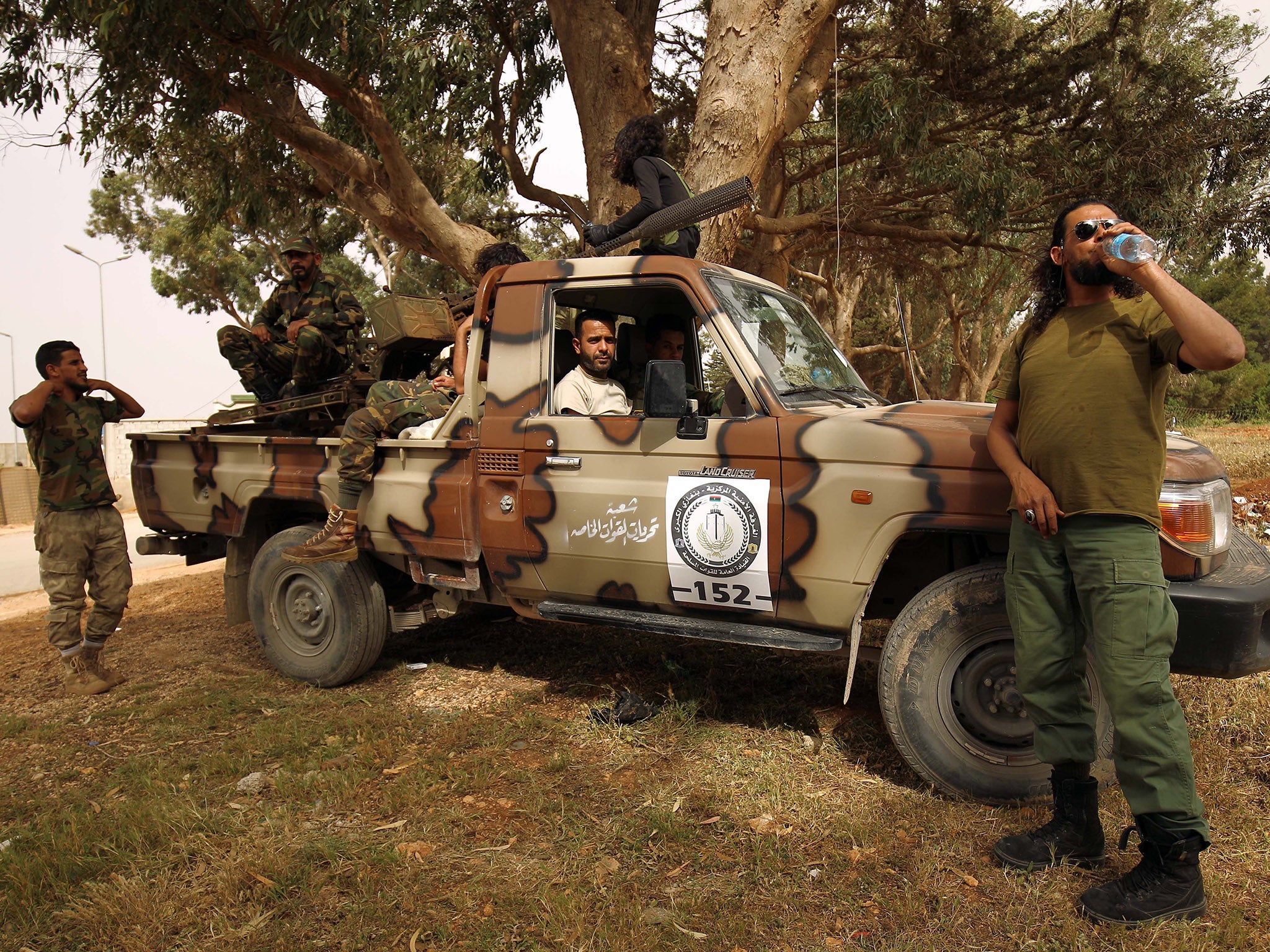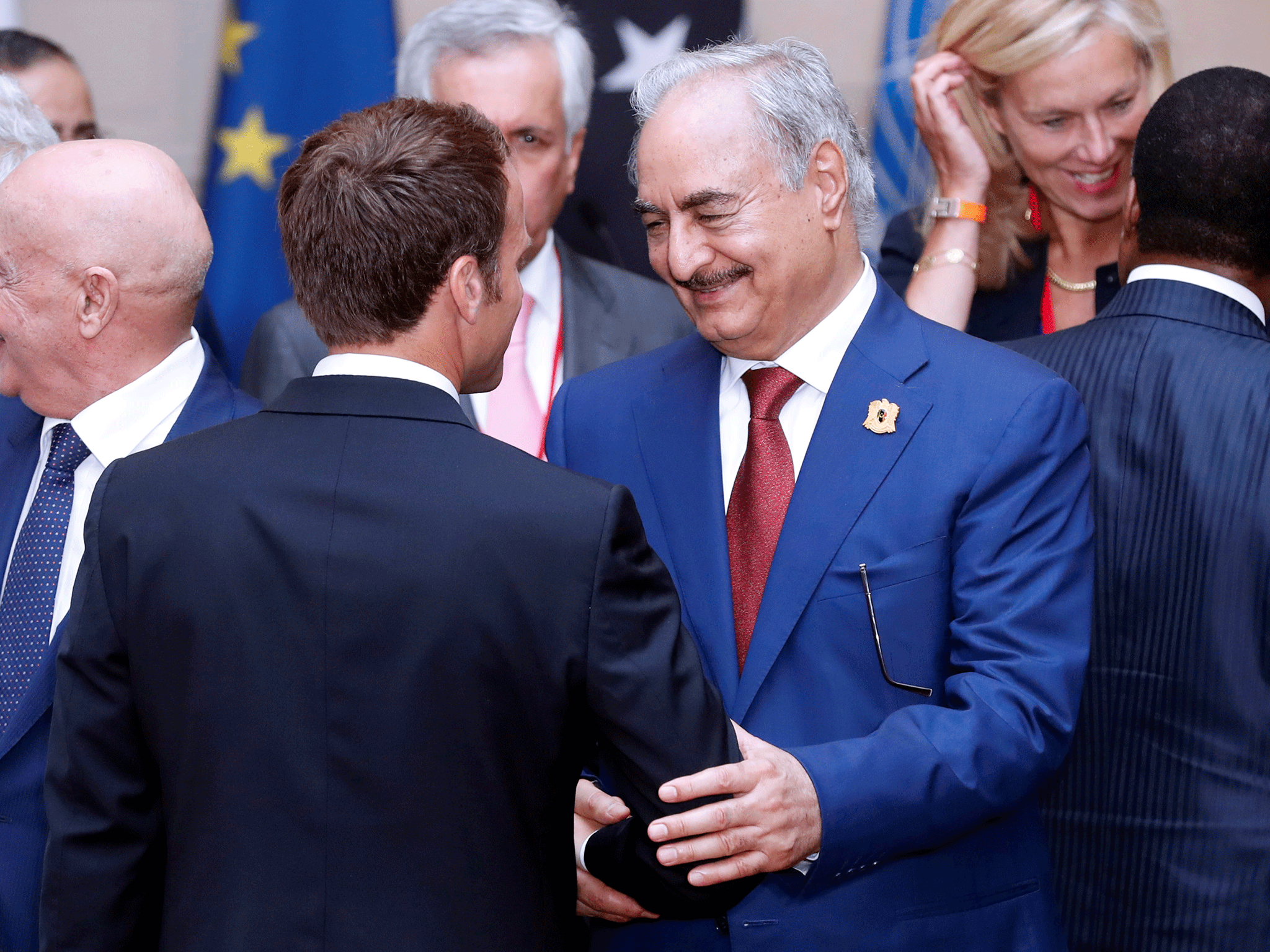Battle for Libyan city of Derna, where 125,000 people face ‘unprecedented levels of violence’
Coastal city is renegade general's last major target in east of country, where water, food, medicine and electricity are already running out

Your support helps us to tell the story
From reproductive rights to climate change to Big Tech, The Independent is on the ground when the story is developing. Whether it's investigating the financials of Elon Musk's pro-Trump PAC or producing our latest documentary, 'The A Word', which shines a light on the American women fighting for reproductive rights, we know how important it is to parse out the facts from the messaging.
At such a critical moment in US history, we need reporters on the ground. Your donation allows us to keep sending journalists to speak to both sides of the story.
The Independent is trusted by Americans across the entire political spectrum. And unlike many other quality news outlets, we choose not to lock Americans out of our reporting and analysis with paywalls. We believe quality journalism should be available to everyone, paid for by those who can afford it.
Your support makes all the difference.One of Libya’s many private armies is advancing into the long besieged coastal city of Derna, between Benghazi and the Egyptian border, as violence reaches unprecedented levels, according to the UN.
Heavy ground fighting and widespread destruction of houses by airstrikes and shelling is exacerbating severe shortages of water, food, medicine and electricity.
The assault on Derna, which has a population of 125,000, by the forces of renegade General Khalifa Haftar, known as the Libyan National Army (LNA), is the latest episode in the internecine warfare which has torn Libya apart since the NATO-backed overthrow of Muammar Gaddafi in 2011.
A spokesman for the LNA said on Tuesday that their forces had captured 75 per cent of Derna city.
Gen Haftar is one of the most powerful of the many players in Libya, controlling most of the east of the country after capturing Benghazi last year. With two different governments based respectively in Tripoli and Tobruk, each with shaky authority, it is unlikely that any single actor in Libya can win a decisive victory.
Residents of Derna say that LNA fighters are arresting local people in their houses and at checkpoints. Photographs show military vehicles advancing through empty streets past burned out buildings.
In a speech broadcast on the LNA’s social media pages, Gen Haftar says that “the hour of victory is approaching, as is the announcement that the city of Derna is free of terrorism”.
The UN Support Mission in Libya, UNSMIL, has urged restraint on all sides, and called for parties to ensure “unimpeded humanitarian access and facilitate the safe exit of civilians wishing to leave the city”.
Though Derna has been loosely besieged since July 2017, the fighting abruptly escalated on 16 May when the LNA began its attack on the Derna Protection Forces, an alliance of Islamists and anti-Haftar fighters. Egypt, which backs Gen Haftar, has also launched aerial attacks on the city.
The intensification of the fighting has overshadowed a meeting in Paris last week of Libyan leaders, organised by President Emmanuel Macron, which sought to restore peace and arrange presidential and parliamentary elections for December.
But there are strong doubts that meaningful elections could be held in Libya because power is so fragmented and is primarily held by local leaders whose influence is based on a single city or tribe or a mixture of the two.
Derna is only one of the places in Libya where rival factions have been fighting each other over the last month.
Figures for civilian casualties in May, compiled by UNSMIL in Libya, show 101 dead and wounded in all parts of the country during the month, not counting combatants.
The casualties include 12 men and a woman killed in Tripoli on 2 May when Isis launched an attack with guns and explosives on the Higher National Election Committee.
In the oasis city of Sabha, 400 miles south of the capital, fighting between the Awlad Suleiman and Tebu tribal forces killed at least 10 civilians who fell victim to sniper fire or mortars fired into densely populated areas of the city.
In Benghazi, captured by the LNA after prolonged fighting which lasted from 2014 to 2017 and left a large part of the city in ruins, there is continuing violence. On 24 May a bomb in a vehicle killed 11 civilians, including a baby girl, in an attack for which nobody claimed responsibility but has the hallmarks of an Isis or al-Qaeda type operation.
On the same day in Bani Walid, south of Tripoli, some 200 Eritreans, Ethiopians and Somalis escaped from people smugglers who were holding them prisoner. About a dozen of them were shot dead by the smugglers who then tried to recapture them.
In the face of such widespread anarchy in Libya, the chances of Mr Macron’s diplomatic initiative succeeding look slim. There are also doubts among Libyans about French policy being entirely even-handed, in the light of press reports that France has secretly provided Gen Haftar with a reconnaissance aircraft for use in his bid to capture Derna.

Mr Macron’s attempt to mediate between the different parties in Libya may fail to bring an end to the violence, but earlier this year he admitted that the European and the US military intervention to overthrow Gaddafi in 2011 was the cause of the disasters that have since overwhelmed the country.
Those leading the NATO intervention on the side of anti-Gaddafi rebels were France and Britain, closely supported by the US. David Cameron continues to defend his actions in 2011.
“Europe, the United States and a few others indisputably have a responsibility when it comes to the current situation,” Mr Macron said, in an apologetic speech in Tunisia in February.
He said that foreign states could not act as substitute for the sovereignty of a people in the belief that deposing a tyrant would solve all problems. He said that “since then we’ve collectively plunged Libya into anomie (chronic instability), without being able to resolve the situation”.
Join our commenting forum
Join thought-provoking conversations, follow other Independent readers and see their replies
Comments